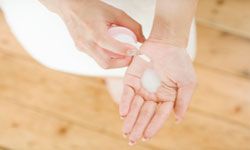Choosing the right moisturizer can be frustrating. So many companies make so many varieties of skin care products -- each with its own sales pitch and promises -- that the search can feel overwhelming. Once you take a look at the back label, things might get even more confusing. What are some the essential ingredients you should find in a moisturizer?
The main goal of moisturizers is to hold water in the outermost layer of your skin, but moisturizers can also serve as a barrier to protect that layer from damage. The ingredients that help moisturizers accomplish these two goals are humectants and emollients.
Advertisement
Humectants take moisture from the air and hold it in your skin. They rejuvenate the skin and smooth out or soften scaly, thick skin. Humectants are especially good for dry skin, but because they take moisture from the air, they work best in a humid atmosphere. Some common humectants to look for on product labels include urea, glycerin, alpha hydroxy acids and dimethicone [source: Mayo Clinic].
Oil- and water-based emollients provide moisture by filling in spaces between skin cells where fat cells used to be. The most common emollients found in moisturizers are lanolin, mineral oil and petrolatum, the latter of which comes from petroleum.
A third common ingredient found in moisturizers is preservatives, which prevent moisturizers from experiencing bacterial growth. Moisturizers might also contain vitamins, minerals, plant extracts such as jojoba, almond or olive oil, sunscreen, and sunless tanners. Other, more specialized moisturizers might include ingredients such as collagen and exfoliants.
Most of the ingredients listed above are fairly common. Although some might be made from animal products, they're generally not harmful. Other ingredients, however, can irritate the skin or cause other damage. You might want to consult your physician or a dermatologist before using a moisturizer that contains the following ingredients: diethanolamine, 1,4-dioxane, coal tar and toluene. These ingredients can have a harmful effect on the environment. Additionally, methyl ethyl ketone, methyl isobtyl ketone, ethyl alcohol, and methylene are parabens, typically used as preservatives in moisturizers. Parabens have been linked to breast cancer, and they're banned in cosmetics in Europe [source: National Geographic Green Guide].
For lots more information, see the links on the next page.
Advertisement

